A Simple Rule Of Thumb For Deciding What To Wear To An Interview
I work at Microsoft on the advertising side of things. Every year we host an annual Awards event in Seattle to recognize our best clients.
This past year, our marketing team sent out an email stating that the dress code for the event was “cocktail casual.”
Nobody had any idea what that meant (even the marketing team).
I mean, Cocktail Attire alone is confusing enough on both sides of the gender spectrum.
Do men need to wear a jacket and tie? Or jacket but no tie? If you're a woman wearing a dress, what length is right? Etc.
Then you add in the word “casual” on top of that and everyone's head exploded!
The whole office spent the next month debating the rules of “cocktail casual” attire and, when the big event rolled around, people were wearing all different sorts of outfits.
My point? When it comes to picking the right attire for a big event, it can be easy to overanalyze.
The good news is that, when it comes to job interview attire, we can follow one simple rule to make sure we never show up out of place:
You'd much rather be wearing a suit into an office full of hoodies and jean shorts than show up wearing a t-shirt in an office full of buffed leather shoes and pant suits.
If you do end up being “too formal,” it's super easy to play off. You can use it as a conversation starter to help you lighten the mood and break the ice with your interviewer.
In the next section, we're going to talk through a few strategies you can leverage to help you figure out the company's culture around their dress code so you can make sure you have the perfect outfit.
3 Strategies For Figuring Out How People Dress For Their Jobs
Now you know you need to be dressed at least one notch above the people you're interviewing with, but where does that fall on the scale of flip flops to fancy formal?
In my experience, company/interview attire can be broken down into three buckets (these are just high level overviews of each, we'll provide specific examples for both genders in a bit).
The Three Tiers of Interview Attire (Examples For Women & Men)
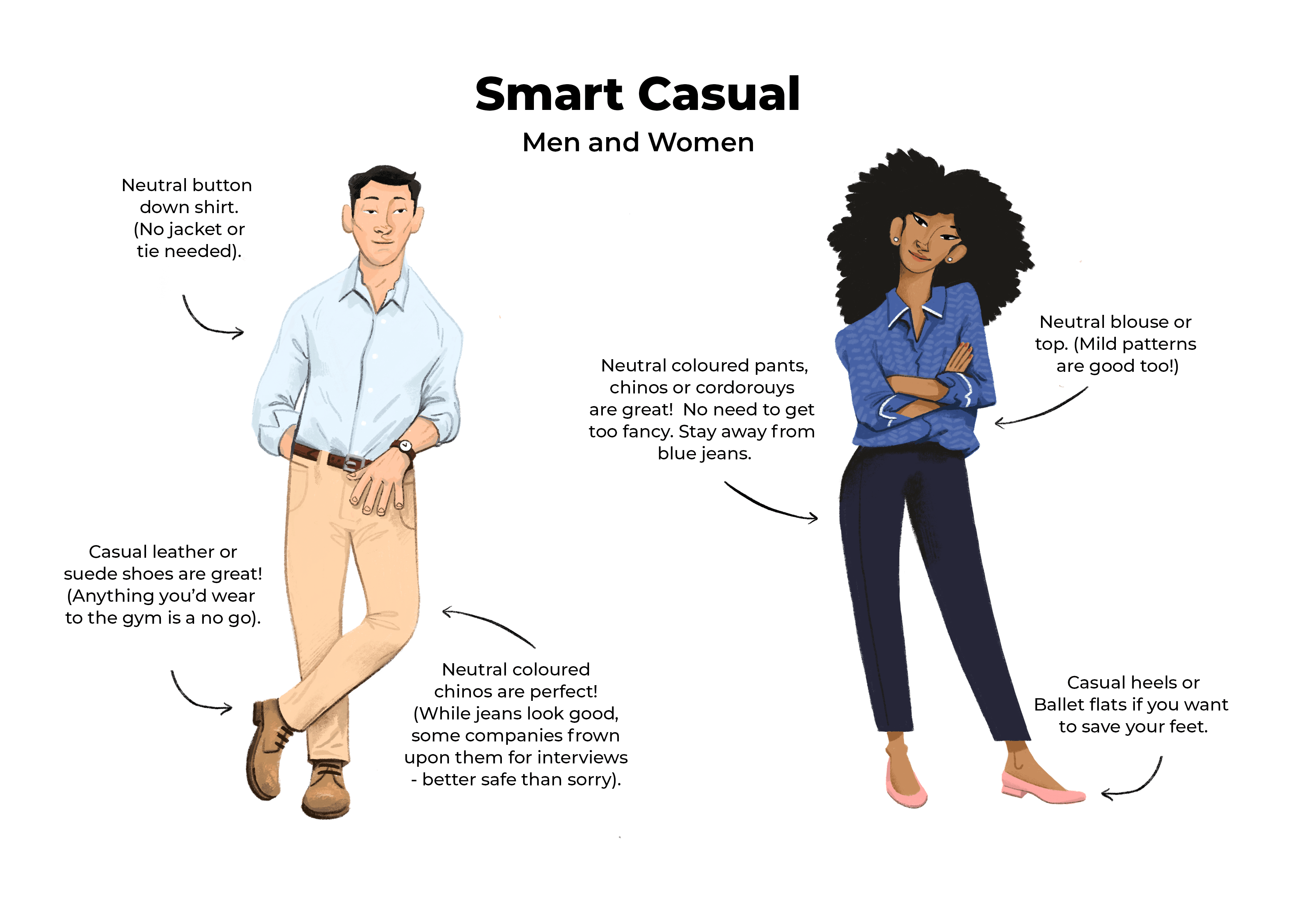 Smart Casual: This dress style is fun and light while still being professional. Choices should be neutral and fit well, but don't need to be overly formal.
Smart Casual: This dress style is fun and light while still being professional. Choices should be neutral and fit well, but don't need to be overly formal.
While people at the company maybe dressed more casually, this is the bare minimum for any interview.
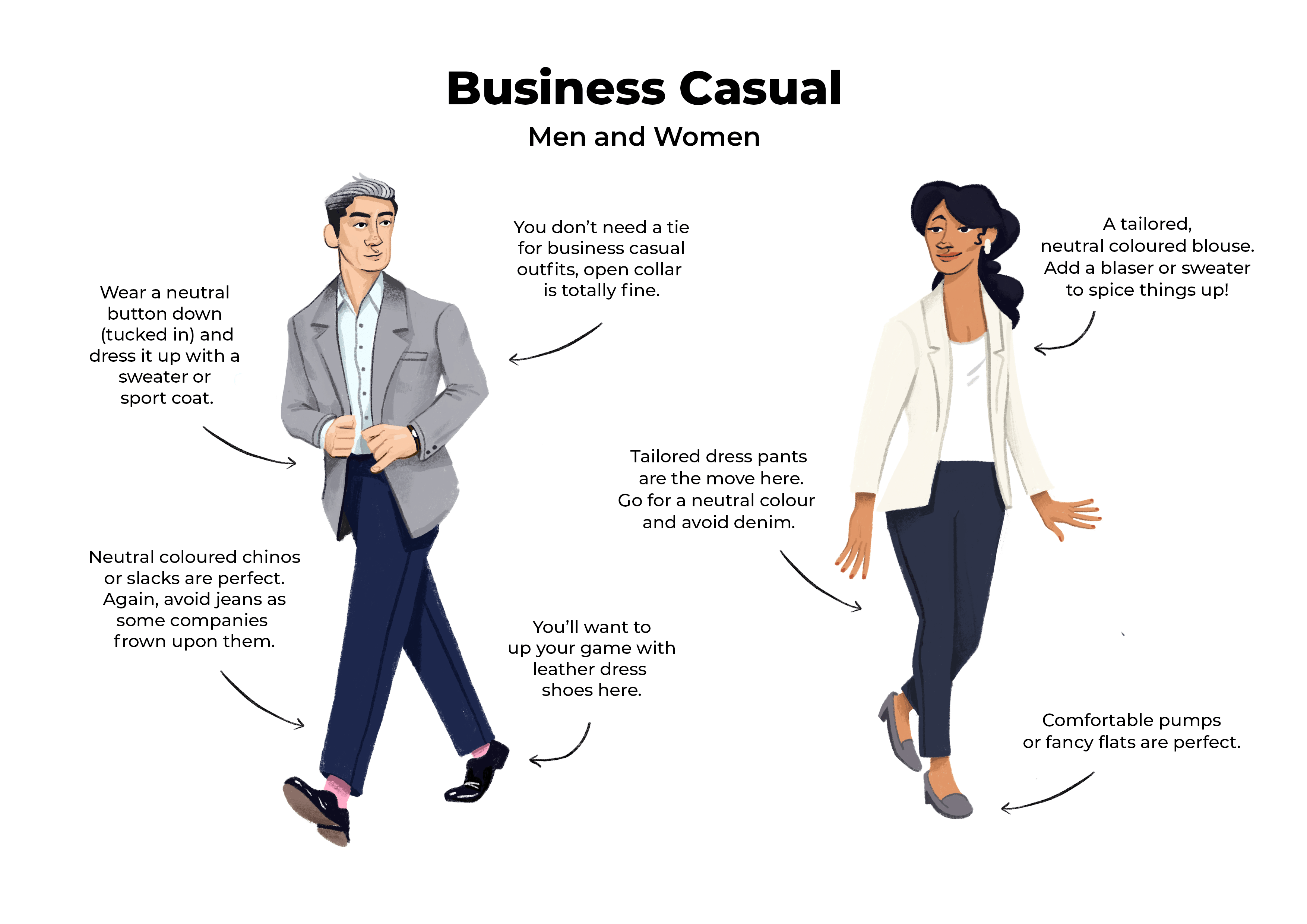
Business Casual: We're not breaking out the full suit here, but we are definitely on the more formal side compared to Smart Casual.
For guys this usually means a sport coat, slacks, and leather shoes. For women, this is a neutral blouse (with a blazer or sweater if needed), tailored dress pants, and fancy flats or pumps.
This is the most common style for interview attire.
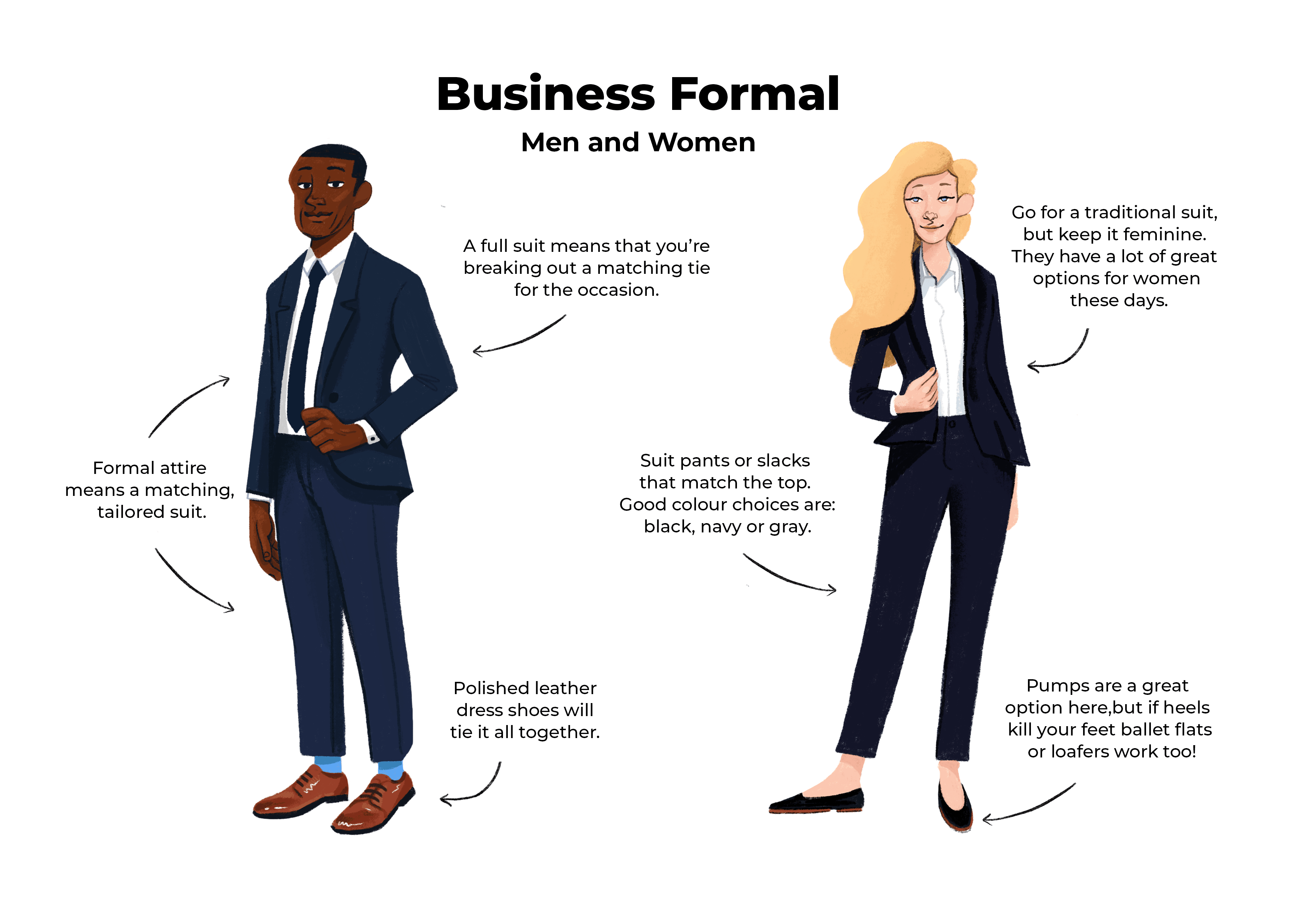
Business Formal: This is your traditional, conservative business look. Think bankers, lawyers, consultants, etc. We're talking full suit and dress shoes for both genders. That said, just because it's formal doesn't mean it can't show a bit of your personality!
Again, these examples are just high level overviews to help you quantify the different levels of interview dress code. We'll dive deeper into specific examples/do's and don't for men and women in just a bit.
Many times it's hard to figure out exactly what current employees are wearing to help you set your barometer. I want to share a few strategies to help you determine exactly what you should to wear to your interview:
Strategy #1: Ask Your Recruiter Or Someone Who Works At The Company
If you've made it to the interview stage, you're probably in touch with someone at the company who is handling logistics. That could be an external recruiter, in-house HR, or a hiring manager. Regardless, definitely feel free to ask them what you should wear to your interview – it's a totally normal question that they should be happy to answer.
Here's a quick email template you can use:
Email Template: How To Ask About Interview Attire
Hi [Name],
I am very excited to come in and meet the team on [Interview Date]. I did have one quick question for you — what should I plan to wear to the interview? I want to make sure I'm showing up the right way and I always feel like it's better to ask than assume.
Thank you so much for the help.
Best,
[Your Name]
If they give you a vague answer like, “oh whatever you wear to work is fine,” you can always follow up and ask them to be more specific or you can reach out to another person who works at the company and see what they think.
If hoodies and sneakers are cool at your office but their dress code is a bit more formal, things can get awkward. Making sure the expectations are set early is the best way to go here!
Strategy #2: Look Through The Company's Social Media Accounts
In today's world, almost every company is highly active on social media where they're sharing product releases, major events, and their company culture.
This usually means plenty of pictures of employees at work that you can use as a reference point. For example, Teachable – a startup that helps people create online courses – posted a picture of their team out to lunch and mentioned they were hiring:
Looks like most of the team is in casual/smart casual clothes, which gives you a great reference point for what to wear if you were interviewing with them.
Strategy #3: Search For Company Profiles Online
Many companies are leveraging their offices to nab headlines at awesome publications and get more eyeballs on their brand.
For example, if you Google “Inside LinkedIn's Offices” you get a list of 10+ articles from various outlets that all offer you a sneak peak into the company's office.
Those articles typically have a photoshoot taken during a regular workday, which means you get unsuspecting employees giving us a glimpse into their everyday wardrobes.
From that photo, it looks like smart casual is the attire of choice which means you might want to opt for business casual (one notch up) if you were interviewing at LinkedIn.
Looks like everyone there is business casual at a minimum, but most people are rocking business formal (I see a lot of suit jackets and sport coats).
You're going to want to break out the suit for that interview.
Additionally, places like The Muse are doing company profiles where they show up at an office, take a bunch of pictures, and actually interview current employees about what it's like to work there.
The goal is to give job seekers a better sense of the company and its culture, but we can also use it to see what people are wearing to work every day. Check out this image from Proof, an eComm-focused startup:
Looks pretty casual to me! I'd probably be going in some sort of smart casual dress code to that interview.
The bottom line? Finding creative ways to get some eyeballs inside your interviewer's office is a great way to see how people show up to work every day.
With your goal of being one notch higher on our three-tiered scale of dress code, that will give you a great idea of what to wear to your interview.
6+ Examples Of What To Wear To Your Job Interview For Women
Hey ladies! Lily here. I'm subbing in to give my two cents.
“I have nothing to wear.”
How many times have we all said that – especially before a big event like an interview? For must of us, I bet it's way too many times to count.
My goal is to simplify things for you. Interviews are stressful enough. We shouldn't be freaking out over our outfits, while also wondering how to craft a charming and sophisticated answer to “so, tell me about yourself.”
My interview attire philosophy can be boiled down to two basic principles:
- 1Comfort. No matter how formal or casual the dress code is, you need to be comfortable. When you're comfortable with how you look and feel, you exude confidence and you can focus on what really matters that day. So let's avoid anything overly warm, tight (breathing is important), itchy, etc.
- 1
- 2No one should notice your outfit. I know I just contradicted what my husband said about first impressions, but hear me out. If your clothes and accessories are really loud (even if they're cute), your interviewer will be distracted. If your outfit doesn't fit right, or if it looks sloppy, you will draw negative attention to yourself. Stick to neutral, well fitting clothes in order to keep the focus on you and all the amazing qualities you bring to the table. Channel your inner Meghan Markle for interviews and leave your Lady Gaga inspired outfits for the weekends.
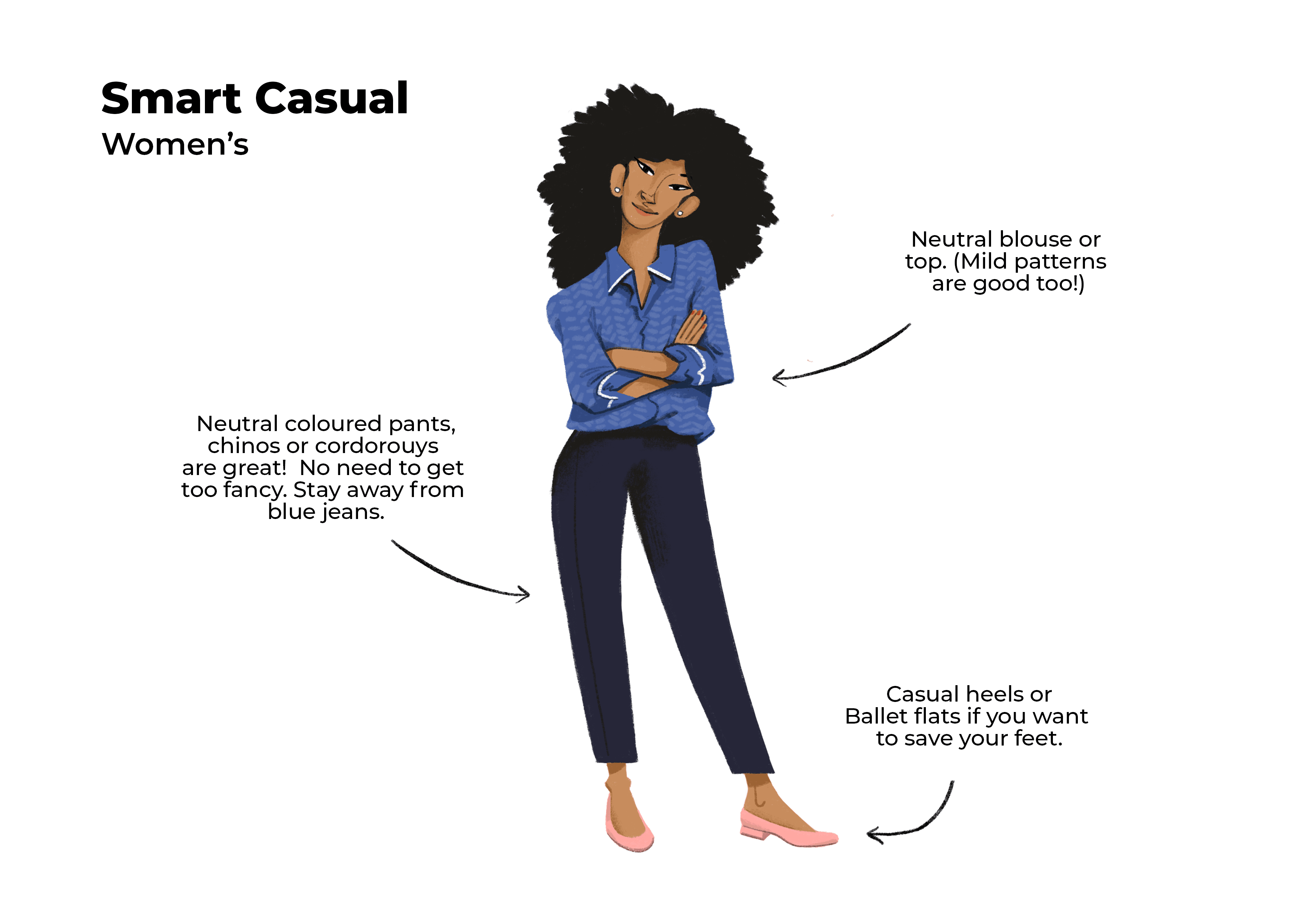
#1. Smart Casual Interview Outfit Examples For Women
Smart Casual is a pretty ambiguous style, so it can be tough to know how to draw the line between too casual or too formal. I really liked this quote from Trend Spotter that helps differentiate between Smart Casual and Business Casual:
“Due to its polished yet relaxed aesthetic, smart casual attire is often confused with business casual dress code. While many outfits can fall into both categories, there are differences between the two. For instance, business casual tends to require a more conservative style of dress while smart casual can be more fashion-forward.”
Overall, Smart Casual is great because it lets you show off some of your personality during the interview. Just make sure to err on the side of professional. If you're wondering if something is too informal, then it probably is. Let's run through some outfit ideas to help you look perfectly smart and casual:
Women's Outfit Example #1
Top: Button down. You definitely don't have to tuck it in all the way for Smart Casual. I'm a big fan of the French Tuck, which was recently popularized by the fabulous Tan France on Queer Eye.
Bottom: Chinos (navy, olive, khaki). I love ankle cropped pants here, since they give a more relaxed look.
Shoes: Ballet flats. If your outfit is neutral, you can safely wear shoes with a color or mild pattern. But if you already have some patterns going on in your top, opt for more simple shoes.
Accessories: Less is more. Stud earrings (if you wear earrings) with a simple necklace or bracelet / watch.
How easy was that? I bet you could put something like this together without having to buy anything new. Now let's try a slightly different variation of Smart Casual.
Women's Outfit Example #2
Top: Blouse (swap for a sweater if it's freezing!)
Bottom: Black jeans (make sure to stay away from blue jeans)
Shoes: Booties with a low heel
Accessories: Again, keep it simple. Go for small earrings with a basic gold or silver necklace.
With Smart Casual, aim to express yourself, but stick to simple and conservative clothes. You should look relaxed, yet polished. If you could wear this outfit to work in the morning, the interview in the afternoon, and then to a dinner with your parents, you know you hit the jackpot.
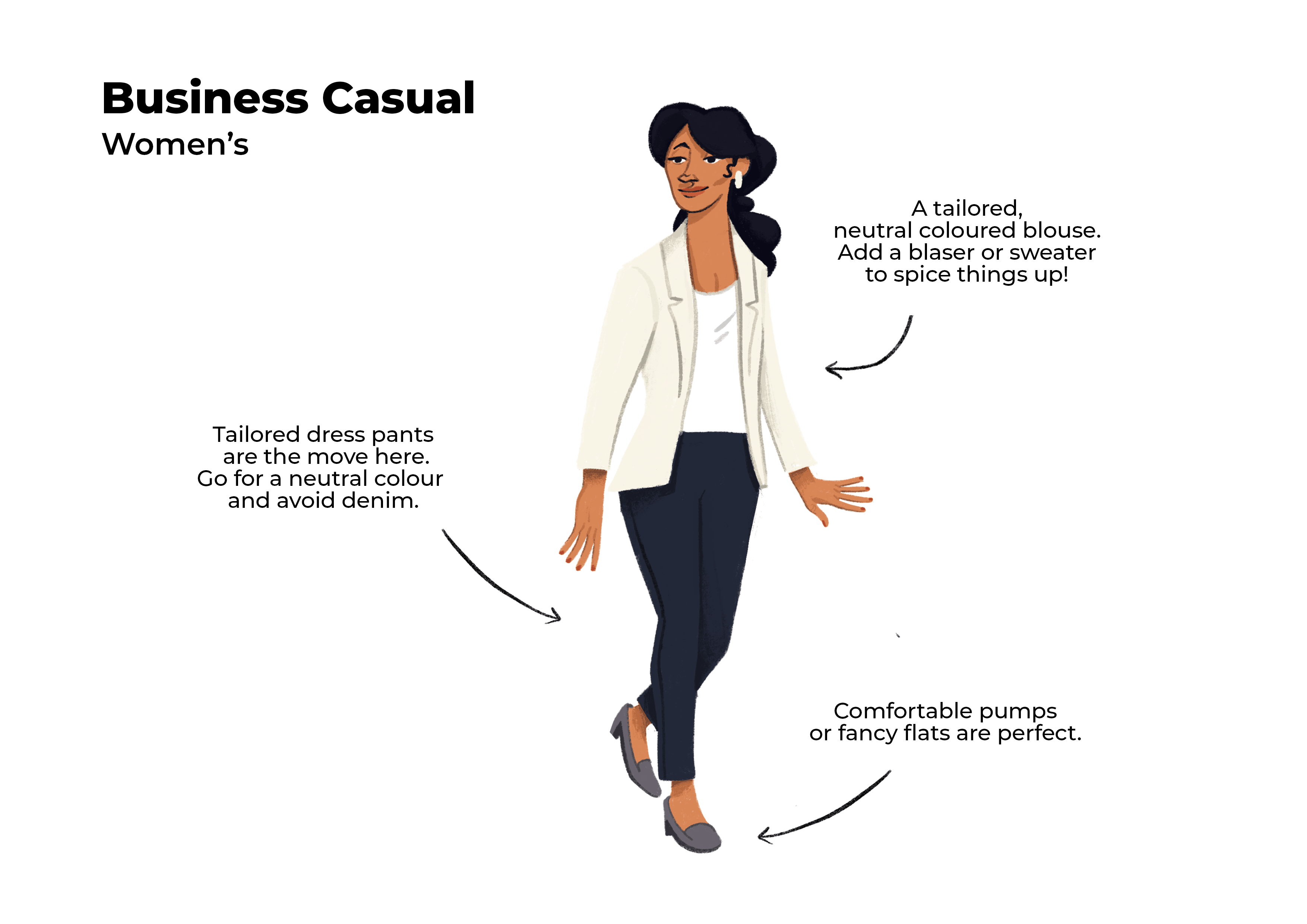
#2. Business Casual Interview Outfit Examples For Women
Business Casual is a super popular interview style. It's typically a safe bet too. This look strikes an even balance between casual and corporate, so you can walk into most offices and feel like you fit in.
Your Business Casual outfits should be elevated from your Smart Casual look. You definitely still have room to show your personality here, but there are some staples you should stick to in order to make sure you nail this dress code.
A tailored blazer is the easiest way to class this look up. It doesn't have to be a formal suit blazer – there are tons of other options out there that look a bit more stylish. My other tip for Business Casual is to avoid denim all together (obviously no blue jeans, but I wouldn't do black either).
Women's Outfit Example #1
Top: Tailored blazer + blouse (I'd go for a traditional tuck-in as opposed to a French Tuck)
Bottom: Navy chinos or cropped dress pants
Shoes: Neutral loafers or flats
Accessories: Minimal. Wear your trusty watch and stud earrings.
If your blazer is black or blue, you can opt for a blouse with a soft pattern. And if you have to go out and buy that blazer, there are tons of reasonably priced options out there that are super cute. I grabbed one from H&M for an interview a few months ago and I style it with my weekend looks all the time now!
Women's Outfit Example #2
Top / Bottom: Simple knee length black dress + black tights
Shoes: Flats or booties with a low heel
Accessories: Throw on a simple necklace and basic earrings
With Business Casual, your main goal should be to keep things professional and relaxed. And don't be afraid to show some personality! Just balance any patterns or color with neutrals and you will be good to go.
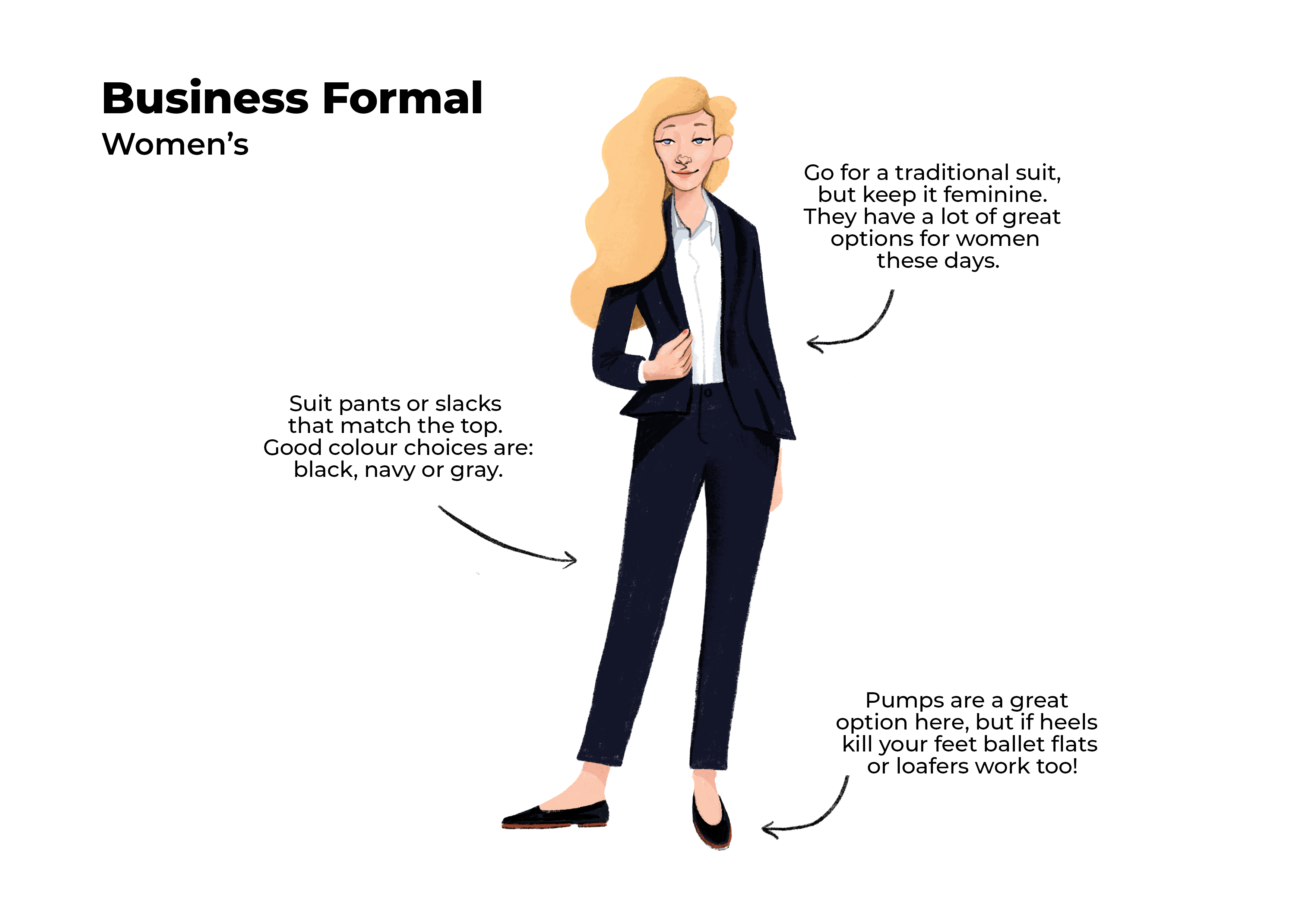
#3. Business Formal Interview Outfit Examples For Women
This is admittedly my least favorite category. Let's be honest – it takes a lot more effort and it's not as easy to stick to my comfort rule in formal attire. But it's possible. I promise!
Thanks to evolving fashion trends, women have much better Business Formal options than we used to. The suits today look feminine and dare I say…trendy? Ok, trendy may be stretching it a bit, but at least you can wear a suit without engulfing yourself in shoulder pads and excess fabric.
For anyone who doesn't wear pants, Business Formal can extend to pencil skirts or dresses + a blazer. And if you don't want to purchase these formal (and sometimes pricey) clothing items, Rent the Runway is a great option. You can rent a Business Formal outfit instead of buying expensive clothes that will probably sit in the back of your closet for eternity after your two hour interview.
Women's Outfit Example #1
Top: Blazer + white button down
Bottom: Cropped dress pants that match the blazer
Shoes: Tailored flats (black shoes are your safest bet)
Accessories: Opt for simple gold or silver pieces. Earrings and a watch will do.
This is a pretty standard formal interview outfit. You can't go wrong with basic black and white. Also, don't be afraid to wear flats! Especially if heels kill your feet. There are plenty of flats out there that look nice enough to pair with Business Formal attire.
Women's Outfit Example #2
Top: Blazer + blouse
Bottom: Dress pants (slight flare or boot cut) that match the blazer
Shoes: Black pumps (for my ladies who love heels)
Accessories: You know the drill – pick a few pieces and keep it simple!
I know most of us wouldn't typically throw on a suit if we didn't have to, but that doesn't mean you should sacrifice the comfort rule. You can look formal and still be comfortable. Make sure your dress pants fit you well (length, waist, etc.) and if you typically wear feminine clothes, then find a feminine suit. They're out there!
6+ Examples Of What To Wear To Your Job Interview For Men
Alright guys, it's our turn!
My goal is to make this as simple and painless as possible. The good news for us is that our choices are pretty cut and dried. We can start with a couple of immediate go-to's, a strong foundation, and then you can improvise and style right off of that.
We'll start with the most diverse and casual outfit in our arsenal:
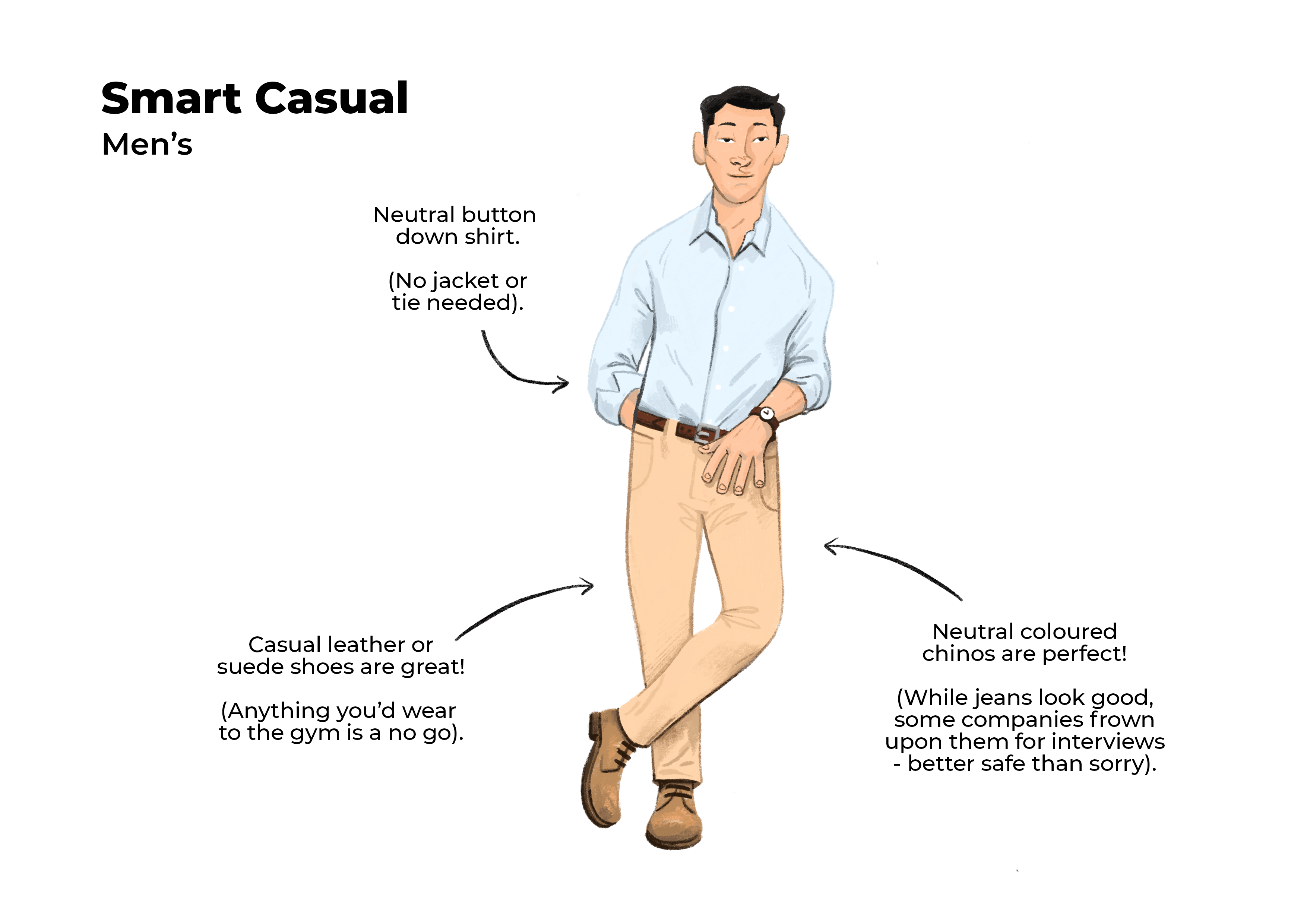
#1. Smart Casual Interview Outfit Examples For Men
Oxford's dictionary defines Smart Casual as, “neat, conventional, yet relatively informal in style.”
Fasion site Mr Porter defines it as, “pretty much anything smarter than a tracksuit, but less formal than a suit.”
I like to think of it as something you'd wear on a first date with someone who's slightly out of your league. You definitely want to look sharp, but you also don't want to look like you tried too hard.
Your best bet is going to be a neutral button down, chinos, and shoes that are nicer than sneakers. While most non-interview Smart Casual outfits will include jeans, I would not recommend wearing jeans to your interview. Better safe than sorry. Let's look at a few examples:
Men's Outfit Example #1
Top: White button down, steamed and wrinkle free
Belt: Always, and it should match your shoes (light shoes + light belt, dark shoes + dark belt)
Bottom: Khaki chinos
Shoes: Clark's desert boots or casual leather oxford
Accessories: Watches are always a great add here
Men's Outfit Example #2
Top: Gingham button down, matching sweater/jumper
Belt: Always, and it should match your shoes (light shoes + light belt, dark shoes + dark belt)
Bottom: Navy chinos
Shoes: Leather lace up oxfords
Accessories: None needed, but again, a watch is a great add and don't forget to tuck in that button down if you're wearing a sweater
When it comes to smart casual, the best mantra is “when in doubt, toss it out.” In other words, play it safe and conservative. If you're doubtful about whether or not you should wear something, don't wear it.
If you dress like the handsome guy in the picture above, you'll be good to go (feel free to swap out the shirt and pants for other neutral color combinations).
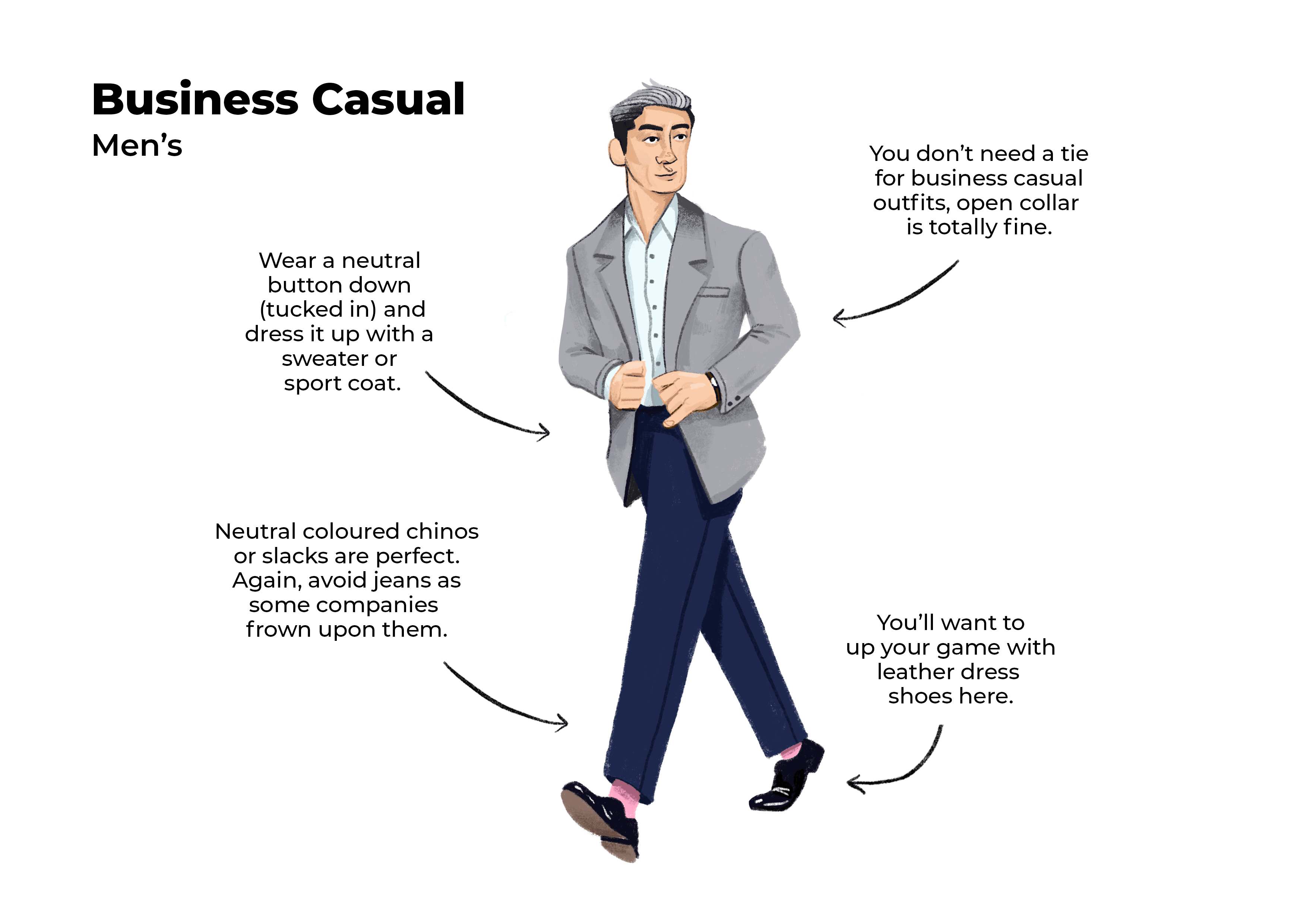
#2. Business Casual Interview Outfit Examples For Men
Business Casual has some more structure for us guys. The rules are a bit more defined and easy to follow – we're taking the same principles from our Smart Casual look and dressing them up a bit.
For example, instead of a free form button down you're going to want a shirt with a bit more structure. Instead of distressed chinos you may want to opt for clean, tailored chinos or slacks.
While you don't need to break out the suit jacket just yet, Business Casual typically calls for some sort of sport coat or blazer (but you definitely don't need a tie). Let's check out some examples:
Men's Outfit Example #1
Top: Ironed white button down
Jacket: Gray unstructured sport coat
Belt: Always, and make sure it matches the tone of your shoes
Bottom: Navy slacks
Shoes: Polished leather loafers or oxfords
Accessories: Watches are great, you can also add a pocket square to your sport coat if you want to spice things up. No tie needed at this point.
Men's Outfit Example #2
Top: Ironed white and blue checked dress shirt
Jacket: Gray cardigan
Belt: Always, make sure the belt matches the tone of your shoes
Bottom: Ironed Navy dress chinos
Shoes: Polished, dark leather dress shoes
Accessories: Watches are great, you can also add a pocket square to your sport coat if you want to spice things up. No tie needed at this point.
Business Casual is pretty easy to pull off. If you just think about leveling up your smart casual look and adding a jacket, you'll be all set — or you can just match our guy in the picture above to make things super simple!
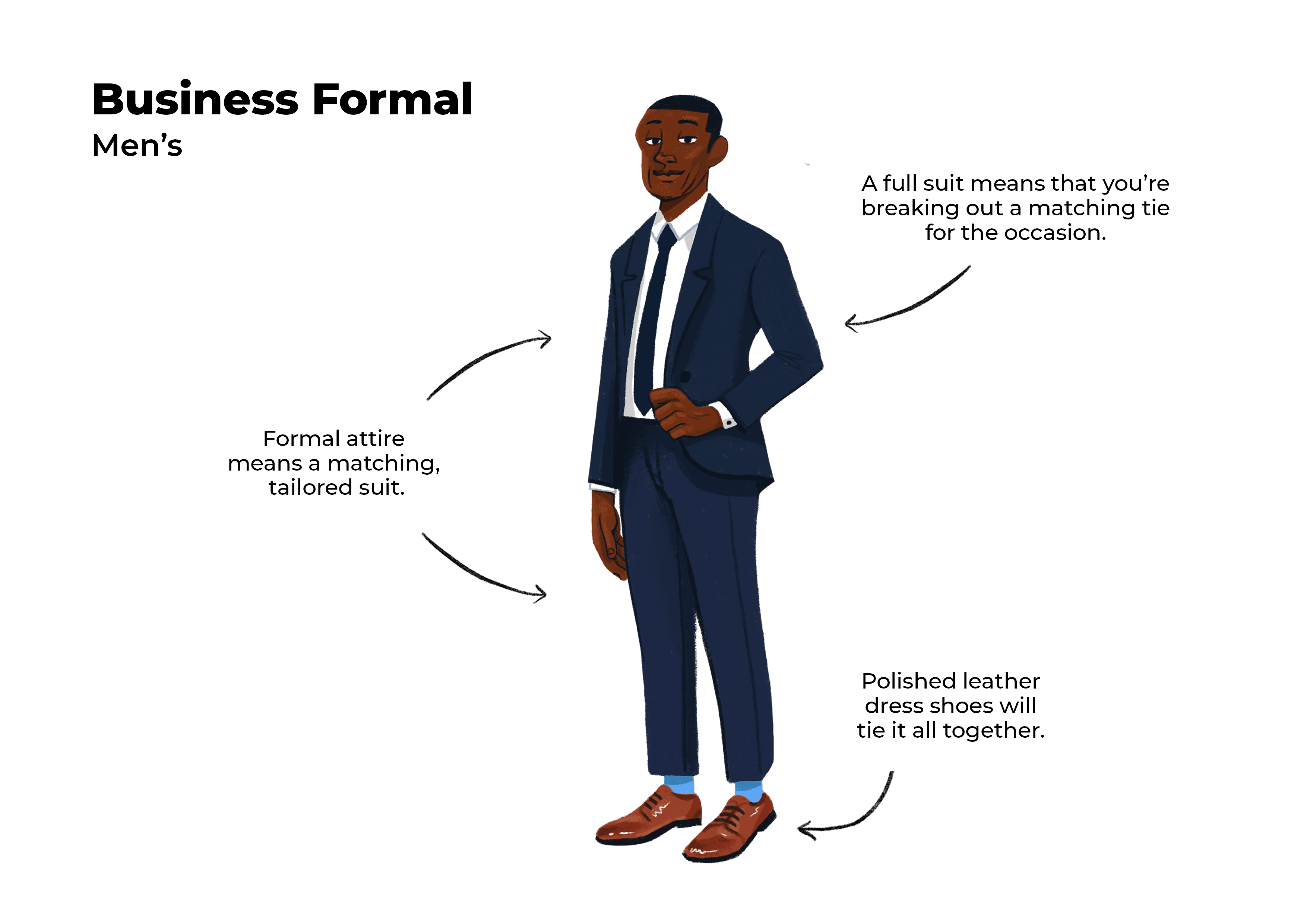
#3. Business Formal Interview Outfit Examples For Men
Our most formal option and the easiest to prepare for. You're going full matching suit and tie for this one!
The biggest thing to watch out for here is matching the suit and shoes. The suit's already going to match, but you don't want to ruin the whole thing with a goofy color choice for your shoes. Just because they're fancy doesn't mean they work with the outfit. Business Insider has an awesome guide to help you match suits and shoes.
When you're suiting up, your best option for showing off some personality is with your tie. Be careful though, it's easy to go a little crazy. You still want to keep things on the professional / conservative side, but don't be afraid to go beyond basic black or blue if you feel compelled.
Men's Outfit Example #1
Top: Pressed white dress shirt
Jacket: Suit jacket
Belt: None
Bottom: Suit pants that match your jacket
Shoes: Polished formal dress shoes
Accessories: Tie is a must here, watches are great, and a pocket square is always a nice touch if it's your thing
Black and blue suits are a super common and traditional move. They look awesome and are definitely a safe play. If you want to spice things up, you can switch up the suit color to something that's not quite as common like a charcoal or gray.
Just don't go Miami Vice on us with the white, khaki, or seersucker. You may think I'm dumbing it down a bit too much — I wish I wasn't, I've seen it.
Men's Outfit Example #2
Top: Pressed white dress shirt
Jacket: Light gray suit jacket
Belt: None
Bottom: Light gray suit pants that match the jacket
Shoes: Brown or black formal dress shoes
Accessories: Tie and watch
Business Formal is the safest move you've got. You're never going to be under dressed if you roll with this and it's a great move if you're not sure what to expect. I've never heard of anyone not being hired for being over dressed, but I've heard plenty of stories about the reverse. Plus, everyone looks awesome in a full suit and tie!
5 Pre-Interview Tips To Make Sure Your Style Is Bulletproof On The Big Day
Awesome, now you know what you're going to be wearing on the big day! But interview preparation doesn't end there.
One of the best things you can do to maximize your chances of success is cover all of your bases and plan for the worst. These tactics will help you make it happen:
Tip #1: Do Your Laundry 72 Hours Before Interview Day
Part of nailing that first impression is how your clothes look when you show up.
You could be wearing a full suit, but if it has stains on it or it's wrinkled like it's been sitting on the floor of your closet for weeks, that kind of defeats the whole purpose.
We want to make sure our outfit is clean and crispy. The best way to do that is making sure to do the laundry or get the dry cleaning done at least 48-72 hours before your interview!
Tip #2: Prepare Your Interview Attire The Night Before
You never want to be stuck in a situation where you're preparing your outfit (or scrambling to prepare anything) the day of your interview.
When interview day rolls around, everything should be ready to go and planned out. The only time you should spend is focusing in on your game plan for the big day.
One of the things that helped me save some mental bandwidth was laying out my interview outfit (or outfits) the night before. I'd make sure it was ready, stain-and-wrinkle free, and hanging up before I went to bed. That way it was ready to pack the moment I woke up.
I don't recommend packing your interview outfit the night before. We want to avoid bunching and wrinkles so the less time spend in a bag, the better!
Tip #3: Pack A Backup Interview Outfit (If You Can)
If you have the option to pack a backup interview outfit, do it!
You never know what can happen between now and the moment you need to suit up. A giant rainstorm could pop up out of nowhere, a bird could decide to go number 2 right as you're leaving the office, or John in Accounting might spill that homemade marinara all over you.
If you're able to drop a spare outfit in the trunk of your car or somehow squeeze it into your backpack, it's absolutely worth it for the peace of mind.
Tip #4: Don't Skimp For The Video Interview
You may be tempted to skip a few steps because Skype is never crystal clear right? That stain from last week's meatball sub won't make it into the frame, right?
Wrong.
You want to treat your video interviews the same way you'd treat an in person. One, because you'll feel better if you give it the same weight.
Two, because you never know how your video is going to be viewed. Some companies have some very large screens they may be projecting your video on. A dot on your shirt in real life might be a 3 inch crater on am 80″ flat screen. Better safe than sorry here!



0 Comments